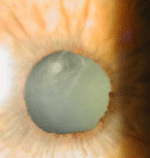Contact us: 0161 701 2714

Cataracts
What is Cataract?
A cataract is quite simply clouding of the tiny lens that is naturally present in the eye. This lens is located just behind the iris, so in advanced cataract the pupil appears to go cloudy / white. It is most commonly due to age, but can sometimes be as a result of other diseases or treatments.
Once the lens begins to cloud over the changes are irreversible, fortunately in the majority of patients the blurring of vision that results, progresses very slowly - over months or years.
What is the treatment?
There is only one possible treatment for cataracts and that is surgical removal of the cloudy lens. A new clear artificial lens is then inserted into the eye at the time of the surgery. It is a very commonly performed procedure worldwide and at the Manchester Royal Eye Hospital we perform more than 5000 a year on both private and NHS patients.
What happens at the Centre?
There are a number of Consultant Ophthalmic Surgeons at the Private Patient Centre who perform cataract surgery. At your initial assessment you will be seen by your chosen Consultant who will assess the degree to which the lens has clouded and will advise you as to whether surgical treatment is needed. Once fully informed you will have to weigh the likely benefit of surgery against the potential risks and decide whether or not you wish to proceed.
The surgery itself is carried out in the state-of-the-art theatres at the Manchester Royal Eye Hospital and will be performed by your chosen Consultant. Under normal circumstances cataract surgery is done under local anaesthetic, which is generally painless, and patients come and go on the same day.
Are there any side effects?
As an operation, cataract surgery is very safe, but all procedures carry some risks. There is always a small chance of complications during or after the procedure. The primary risk in cataract surgery is that your vision could end up worse than it was prior to the operation, but this is thankfully rare. There is around 1 in 100 chance of this happening. Your surgeon will give you a detailed explanation of the risks involved prior to the operation being carried out.
How do I make an appointment?
Your Consultant’s secretary will be able to assist you with availability and costs for your chosen consultant. You can find their contact details by clicking on the link below or visiting the Consultants section.
For further information or to book a consultation contact:
